Tamilnadu State Board New Syllabus Samacheer Kalvi 12th English Guide Pdf Prose Chapter 6 On the Rule of the Road Text Book Back Questions and Answers, Summary, Notes.
Tamilnadu Samacheer Kalvi 12th English Solutions Prose Chapter 6 On the Rule of the Road
12th English Guide On the Rule of the Road Text Book Back Questions and Answers
Textual Questions:
1. Answer the following questions in one or two sentences each: (Note: 10 → Important Questions) (Text Book Page No. 180)
Question a.
Why did the lady think she was entitled to walk down the middle of the road?
Answer:
The lady thought that they got liberty. She could walk anywhere she liked even if it is the middle of the road.
Question b.
What would be the consequence of the old lady’s action?
Answer:
The consequence of the old lady’s action would be universal confusion.
Question c.
What does the ‘rule of the road’ mean?
Answer:
The road of the rule means that in order that the liberties of all may be preserved, the liberty’ of everyone must be curtailed.
Question d.
Why should individual liberty be curtailed?
Answer:
Individual liberty should be curtailed in order to enjoy a social order which makes one’s liberty a reality.
![]()
Question e.
How would a reasonable person react when his actions affect another person’s liberty?
Answer:
A reasonable person would understand that if the traffic police don’t interfere with the liberty of individuals at signal points, there will be a huge traffic jam and none will be able to drive on the road.
Question f.
Define Liberty as perceived by the author.
Answer:
Liberty is not only a personal affair but also a social contract. It is an accommodation of interests.
Question g.
According to the author, what are we more conscious of?
Answer:
We are more conscious of the imperfections of others than of our own.
Question h.
What is the foundation of social conduct?
Answer:
A reasonable consideration for the rights or feelings of others is the foundation of social conduct.
Question i.
How can we sweeten our life’s journey?
Answer:
We can sweeten our life’s journey with the-little habits of commonplace interactions accommodating the interests of fellow human beings.
Question j.
What does the traffic policeman symbolize?
Answer:
The traffic policeman is a symbol of liberty and not tyranny.
![]()
2. Answer the following questions in three or four sentences each: (Text Book Page No. 181)
Question a.
What is ‘liberty’ according to the old lady?
Answer:
- According to the old lady, walking wherever she likes is her liberty.
- She feels so as the people of her country have got liberty.
Question b.
How would ‘liberty’ cause universal chaos?
Answer:
If the traffic police do not interfere with driving in any way, the result would be chaos. Piccadilly Circus would be a maelstrom which no one would be able to cross.
Question c.
Why is there a danger of the world getting ‘liberty drunk’?
Answer:
- When an individual asserts his liberty and does what he likes, he would be disturbing other person’s liberty in one way or the other.
- Thus there arises a danger of the world getting ‘liberty drunk’.
Question d.
‘Curtailment of private liberty is done to establish social order’ – Do you agree?
Answer:
- Yes, liberty is considered to be a social commitment.
- One can enjoy one’s liberty to their fullest as long as it does not hinder others.
- If so it should be curtailed.
- Only then social order can be maintained.
![]()
3. Answer each of the following in a paragraph of 100-150 words: (Text Book Page No. 181)
Question a.
What do you infer from Gardiner’s essay ‘On the rule of the Road’?
Answer:
A.G. Gardiner’s essay ‘On the rule of the Road’ is a treatise on “liberty”. He starts the essay with an anecdote. A liberty-drunk Russian lady starts walking down the middle of the Highway frustrating car drivers, bus drivers, and the traffic police. When questioned about her behaviour, she just replied that she now has the liberty to walk anywhere she liked. The author observes that if a- pedestrian gives up the pavement in preference to the road, cars will be forced to move on to the pavement. This would result in universal chaos. Everybody would be getting in everybody’s way. Nobody would get anywhere. Individual liberty would have become social anarchy.
Under such circumstances, the world is in danger of getting liberty-drunk. The rule of the road reminds the readers that in order that liberties of all may be preserved, the liberty of everybody must be curtailed. Thus the traffic police at Piccadilly Circus is not a symbol of tyranny but of liberty. He doesn’t hinder but helps the smooth flow of traffic. One has to allow curtailment of one’s liberty to enjoy the fruits of social order.
Question b.
Explain in your own words, “What freedom means?”
Answer:
Freedom is doing whatever we like without disturbing the liberty of others. In fact, freedom is not considered to be a personal event. Rather it is a social contract. One has got the freedom to choose his dress, eat whatever he likes, follow whatever religion he wishes to follow. Permission from others is not expected in performing these actions. Moreover, it does not disturb others’ freedom in any way. On the other hand, walking in the middle of the road when there is heavy traffic may lead to great chaos. So it is essential that in order to preserve the liberties of all the liberties of everybody must be curtailed.
Question c.
“My right to swing my fist ends, where your nose begins.” Elucidate with reference to, ‘On the Rule of the Road’.
Answer:
Rights are not completely individual affairs. In order to enjoy one’s rights, one has to respect the rights of others too. The lady in Petrograd had the right to walk on the pavement. The right to move stops when the other person’s right to drive starts. A person may have a walking stick and roll it too. But his right just stops where the other person’s nose begins. No one has the right to violate the rights of others. The right, one exercise, must not affect or erode the rights of others. One should not think of one’s own rights but also the rights of others.
A.G.Gardiner beautifully illustrates this idea by emphasising the metaphor of traffic rules. Rules of the road are in fact rules of politeness and unselfishness. One may have absolute freedom in the choice, of food, religion, fashionable dress, upkeep of hair, funny hairstyle, etc. But one must be conscious of the rights of others. So, the statement “my right to swing my fist ends, where your nose begins” fits well with the central theme of the essay ‘ On the Rule of the Road’.
Question d.
Civilization can only exist when the public collectively accepts constraints on its freedom of action – Explain.
Answer:
It is a fact that civilization can only exist when the freedom of the public is curtailed. The liberties of everybody must be curtailed for the liberties of all to be preserved. One may choose to go down the street in a dressing gown. One may have the choice of his food. Once we step into society, our personal liberty of action becomes qualified by other people’s liberty. For instance, if everyone chooses their own way without following traffic rules naturally it will lead to a great chaos. None can reach their destination on time. Thus a good and proper civilization can exist only when the public collectively accepts constraints on its freedom of action.
![]()
Paragraph:
Introduction:
“On the rule of the Road” clearly portrays the difference between individual liberty and social liberty. A stout old lady was walking down in the middle of a street in Petrograd causing great chaos in the traffic. When this was pointed out, the old lady replied that she has got all the liberty to do so, the result of it would be universal chaos.
Author’s explanation on Liberty:
The rule of the road simply means that in order to preserve the liberties of all, the liberties of everybody must be curtailed. When the policeman put out his hand at Piccadilly circus street, we must not think that our liberty has been violated. If we are a reasonable person. We will reflect that he didn’t interfere and hence result would be that we would never cross the Piccadilly circus at all. We have submitted to a curtailment of private liberty in order that we may enjoy a social order, which makes our liberty a reality.
Rule-Independent:
Liberty is not a personal affair but is a social contract. In this context, he brings forth a few examples which reveal individual liberty. Wearing a gown and walking down the street, dyeing one hair, wearing an overcoat, eating whatever one likes, following any religion, etc. These are the few things which do not need any man’s permission. One has got the liberty to practice trombone throughout the night standing on the top of Everest as no person will be found there on the other hand if the same practice is done in his bedroom or in the streets, it naturally interferes with the liberty of other people.
Conclusion:
The author concludes his essay by saying that we have to preserve both individual liberty and social liberty. It is the little habits of commonplace intercourse that makes the journey of our life sweeten or bitter.
![]()
Vocabulary:
Pronunciation – Functional Stress:
a) Now the teacher will read the following words. Listen carefully to the stress in each word. Write against each word whether it is a noun or a verb and mark the stress: (Text Book Page No. 181)
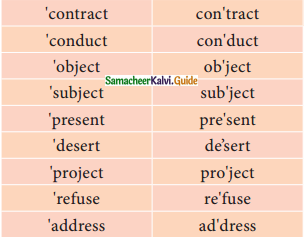
Answer:
| ‘contract | (n) | contract | (v) |
| ‘conduct | (n) | con’duct | (v) |
| ‘object | (n) | ob’ject | (v) |
| ‘subject | (n) | sub’ject | (v) |
| ‘present | (n) | pre’sent | (v) |
| ‘desert | (n) | de’sert | (v) |
| ‘project | (n) | pro’ject | (v) |
| ‘refuse | (n) | re’fuse | (v) |
| ‘address | (n) | ad’dress | (v) |
![]()
c) Some British English words are given in column ‘A’. Write their corresponding American English word is Column ‘B’: (Text Book Page No.182)
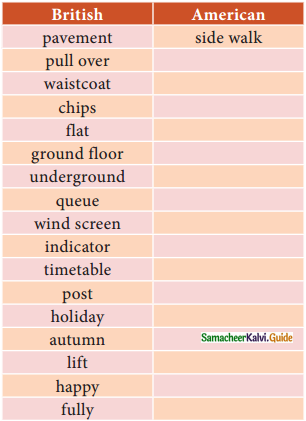

Answer:
| BRITISH | AMERICAN |
| pavement | sidewalk |
| pullover | sweater |
| waistcoats | vest |
| chips | crisps / French fries |
| flat | apartment |
| ground floor | first floor |
| underground | subway/cellar |
| queue | line |
| windscreen | windshield |
| indicator | turn signal / blinker |
| timetable | schedule |
| post | |
| holiday | vacation |
| autumn | fall |
| lift | elevator |
| nappy | diaper |
| fully | completely/full |
| loo | toilet / restroom |
| sweets | Candies |
| bin | trash can |
![]()
d) Similarly there is a difference in the spelling of certain words between American and British English. In Column ‘A’ words are spelled in American. Write down the corresponding British English spelling for those words in column ‘B’. (The first one is done for you) (Text Book Page No.182)
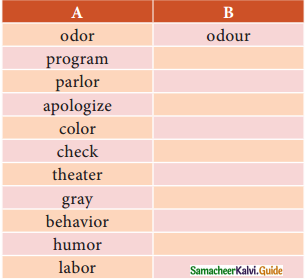
Answer:
| A | B |
| odor | odour |
| program | programme |
| parlor | parlour |
| apologize | apologise |
| color | colour |
| check | cheque |
| theater | theatre |
| gray | Grey |
| behaviour | Behavior |
| humor | humour |
| labor | labour |
![]()
Listening:
Listen carefully to the story being read out and answer the questions: (Text Book Page No. 182)
Question 1.
According to the father, what kept the kite up?
a) the kite itself
b) air
c) the string
d) father’s skills
Answer:
c) the string
Question 2.
The string helped the kite to __________.
a) withstand the pressure
b) break free
c) crash
d) soar high
Answer:
d) soar high
Question 3.
To realize our full potential, we should __________.
a) obey our elders
b) follow a set of rules
C) work hard
d) plan well
Answer:
b) follow a set of rules
Question 4.
A train should go on the __________ to reach its destination.
a) track
b) line
c) road
d) path
Answer:
a) track
Question 5.
To realize our full potential, we should __________.
a) obey our elders
b) follow a set of rules
C) work hard
d) plan well
Answer:
b) follow a set of rules
Question 6.
Taking freedom in our own hands will lead to __________.
a) self-discipline
b) chaos
c) a code of conduct
d) freedom
Answer:
b) chaos
7. The main idea of the passage is __________.
a) the art of flying kites
b) father’s advice to his son
c) the importance of discipline
d) the right to freedom
Answer:
c) the importance of discipline
![]()
Speaking:
Question a.
Everybody enjoys holidays but when it comes to safety ‘There is no holiday for safety’. Discuss in groups what safety measures one should take while driving a car two-wheeler. (Text Book Page No. 183)
Answer:
- Never drink and drive
- Never jump signals
- Follow Road wles
- Maintain speed limit
- Keep a safe distance
- Don’t use a mobile phone while driving
- Always wear a seat belt/helmet
Question b.
Your school has arranged for a road safety campaign, Share a few ideas with your classmates which can be used during the campaign. For example ‘Speed thrills but kills’.
Answer:
- Create awareness about the ill – effects of dangerous online games.
- Alert today – Alive tomorrow
- Speed thrills but kills
- Stop accidents before they stop you.
- Safety rules are your best tools
- Night doubles traffic troubles
- Prepare and prevent – don’t repair and repent.
- Stop driving saves lives.
![]()
Reading:
Cyber Safety
Technology is a double-edged sword. In this day and age, it is not possible to restrict the children totally from using the digital technologies. But some sort of checks and balances should be maintained at all times.
Given below is a text on “Cybersafety” developed from the inputs received from Crime- Branch Crime Investigation Department (CBCID), Tamilnadu dated: 0512.2018. Read the text and answer the questions that follow. (for passage please refer to Text Book Page No. 182).
Questions:
Question 1.
Which of the following should one avoid while using social media? Tick against the correct options: (Text Book Page No. 185)
a. Interacting with strangers on social media [ ✓ ]
b. Avoid posting your picture as a profile picture[ ✓ ]
c. Forwarding Whatsapp messages without verifying facts [ ✓ ]
d. Use a secure browser [ – ]
e.Entering passwords while using public network[ ✓ ]
Question 2.
How can we identify insecure websites?
Answer:
If the website URL starts only as http: I we can identify that it is insecure.
Question 3.
Mention any three details that should not be revealed in the public domain.
Answer:
- Any passwords.
- Credit Card / Debit Card details.
- Bank Account.
![]()
Question 4.
What should parents do to ensure cyber safety for their wards? (Any three points)
Answer:
- The parents should set a fixed time during which children may be allowed to surf the internet.
- They should not keep the computer in a secluded part.
- They should make it a habit of checking browsing history/ hidden files/apps installed etc., on the computer.
Question 5.
Why is it not advisable to play online games?
Answer:
It is not advisable to play online games as it will distract their attention from studies and lead to addiction, homicide or suicide.
Question 6.
Pick out words which mean the same as:
Question a.
stop doing something (para 1)
Answer:
desist
Question b.
place or fix (para 2)
Answer:
installed
Question c.
not protected (para 2)
Answer:
insecure
Question d.
keep a check on (para 3)
Answer:
monitor
![]()
Grammar:
Agreement of the subject with the verb:
Task 1:
I. Choose the correct option and complete the sentences: (Text Book Page No. 187)
Question 1.
Manoj ________(was, were) present along with his parents.
Answer:
was
Question 2.
Each of these boys _______ (has, have) passed.
Answer:
has
Question 3.
Neither Lekha nor Leda ______ (has, have) been selected.
Answer:
has
Question 4.
Every man, woman, and child _______ (was, were) happy.
Answer:
was
Question 5.
One of the machines _______ (is, are)defective.
Answer:
is
![]()
Question 6.
A number of books _________ (is, are) missing.
Answer:
are
Question 7.
Sekar or his brothers _________ (has, have) done it.
Answer:
have
Question 8.
To make a promise and then not to keep it ________ (is, are) dishonesty.
Answer:
is
Question 9.
One of the other of those men _______ (has, have) lodged a complaint.
Answer:
has
Question 10.
Each leaf and each flower _______ (was, were) stripped off the tree.
Answer:
was
![]()
Task 2:
II. Identify the errors in each of the following sentences and rewrite them Correctly: (Text Book Page No. 188)
Question 1.
Either Shyam or Ram have to pay the fine.
Answer:
has
Question 2.
Abdul as well as Karim deserve praise.
Answer:
deserves
Question 3.
Ten thousand rupees a month are an insufficient income.
Answer:
is
Question 4.
Many a student were awarded at the function.
Answer:
was
Question 5.
Neither Veena nor her sisters h been informed of the accident.
Answer:
have
![]()
Question 6.
Mithra as well as her daughters enjoy singing.
Answer:
enjoys
Question 7.
You, who is my friend, should help me.
Answer:
are
Question 8.
My scissors is missing.
Answer:
are
Question 9.
A variety of pleasing objects charm the eye.
Answer:
charms
Question 10.
Sixty miles are a long distance.
Answer:
is
![]()
Writing:
Describing a process: (Text Book Page No. 187)
Task 1:
Preparation of apple juice: (Text Book Page No. 188)
You plan to delight your parents and sister, serving them chilled apple juice. Here is the process: (Complete the sentences with the right form of the verbs)
Question 1.
Four or five apples ____ (take) and ________ (wash) well. They ______ (wipe) dry and cut into pieces of medium size. The seeds ____ (remove). Then the apples ____ (put) into the mixer. Some milk ____(add) .The apples ____ (crush) and a fine liquid ____ (obtain). This liquid ____ (filter) and the juice ____ (store) in the refrigerator. It is _______ (take ) out whenever needed, and after adding sugar, it _________ (serve) in cups.
Answer:
Four or five apples are taken (take) and washed (wash) well. They are wiped (wipe) dry and cut into pieces of medium size. The seeds are removed (remove). Then the apples are put (put) into the mixer. Some milk is added tied (add). The apples are crushed (crush) and a fine liquid is obtained (obtain). This liquid is filtered (filter) and the juice stored (store) in the refrigerator. It is taken (take) out whenever needed, and after adding sugar, it is served (serve) in cups.
![]()
Task 2:
Installing a computer:
The description of installing a computer in your study room is given in the form of jumbled sentences. Rearrange the sentences in the right order and form a coherent paragraph.
- Once you connect the CPU, connect the keyboard and mouse.
- Before turning on the power, check that all parts are connected to the CPU.
- First, open the box and take out the computer parts.
- Plug both the computer and the monitor with a power cord.
- Set the computer on a table or flat surface.
- Finally, turn on the power.
Answer:
- 3
- 5
- 4
- 2
- 1
- 6
![]()
Paragraph:
First, open the box and take out the computer parts. Set the computer on a table or flat surface. Plug both the computer and the monitor with a power cord. Before turning on the power, check that all parts are connected to the CPU. Once you connect the CPU, connect the keyboard and mouse. Finally, turn on the power.
Task 3:
Attempt a description of the following processes, in about 100 words each, either using the imperative or the passive: (Text Book Page No. 189)
1. Preparing your favourite dish:
Omelette:
Ingredients:
Eggs, onion, chillies, cumin powder, pepper powder, salt. Take three eggs. Break the eggs into a bowl. Add two chopped onions, two green chillies, a spoon of cumin powder, and pepper powder to it. Beat all ingredients together with enough salt. Keep a frying pan on the stove. Pour oil and then pour the beaten ingredients on the pan. Cook it and serve it hot.
2. Organising a birthday party at your house:
Plan a budget to organise a birthday party. Invite your friends and family members to your home. Plan the menu for the party. Order a birthday cake. Decorate your home with the necessary things. Plan some activities along with the birthday party. Thank the guests for their presence at the birthday party.
3. Sending a letter by courier service:
Go to a nearby courier service to post your letter. Weigh the cover which contains the letter. It should be 25kg. The size of the cover should not exceed the prescribed form. Write your detail and the recipient’s detail and then pay the money. Now your letter is ready to be sent by the courier service.
4. Obtain a demand draft from a bank:
- Collect a demand draft application
- Fill in the details like senders address
- Mention the amount to be sent
- Mention mode of payment in cash or by cheque.
- Mention the place where the DD is encashed
- Put your sign and hand over the form to the clerk
- Obtain a counterfoil and get your DD.
![]()
ஆசிரியரைப் பற்றி:
ஆல்ஃப்ரெட் ஜார்ஜ் கார்டினர் (Alfred George Gardiner) பிரிட்டிஷை சார்ந்த பத்திரிக்கையாளரும், (journalist) ஆசிரியரும் ஆவார். இவர் ஒரு தலைச் சிறந்த கட்டுரையாளர். இவரின் கதை எழுதும் விதம், கதைக்கரு, கற்றறிந்த சிறந்த மனிதர் என்பதை நிரூபிக்கிறது. இவரின் கட்டுரைகள் On Habits, On Being Tidy and On Talk and Talkers என்பதை உள்ளடக்கியதாகும். சாலை விதி கார்டினரின் Leaves in the wind என்பதின் ஒரு பகுதியாகும். இது Alpha of the Plough என்ற தலைப்பில் வெளியிடப்பட்டது.
![]()
பாடத்தைப் பற்றி:
இப்பாடத்தில் சாலை விதிகளைப் பற்றியும், அதை நாம் கடைபிடிக்க வேண்டிய முக்கியத்துவத்தைப் பற்றியும் ஆசிரியர் கூறுகிறார். சுதந்திரத்திற்கும், விதிகளை பின்பற்ற வேண்டிய கடமைக்கும் உள்ள வேறுபாட்டையும் பிரித்து காண்பிக்கிறார். அதிகமான எடுத்துக்காட்டுகளை கொண்டு ஆசிரியர் உணவு, உடை மற்றும் தனிப்பட்ட விசயங்களில் தனிநபர் சுதந்திரத்தை அனுபவிக்கலாம் என்றும் ஆனால் நம் தனிமனித சுதந்திரம் மற்றவர்களின் சுதந்திரங்களை பாதிக்கக் கூடாதென்றும் அறிவுறுத்துகிறார். ஒவ்வொருவரும் மற்றவரின் செயல்களில் கவனம் செலுத்தாமல் தன் சுதந்திரத்தை நேர்மையோடு அனுபவித்தால் நல்லதே நடக்கும்.
![]()
On the Rule of the Road Summary in Tamil
ஒரு பருமனான (stout) வயது நிரம்பிய பெண்மணி சாலை நெரிசலின் குழப்பத்தோடு (confusion) மற்றும் தனக்கு ஆபத்து நேரிடாவண்ண ம் பெட்ரோகிராடின் (Pedestrian) நடு வீதியில் தனது கூடையுடன் இறங்கி நடந்து கொண்டிருந்தார். இது அவரைக் குறித்த மட்டில் அந்த தளம் வீதியில் நடப்பவரின் இடம்.
ஆனால் அவள் எனக்கு விருப்பமான இடத்தில் நான் நடப்பேன் இப்போது நாம் விடுதலைப் பெற்றுள்ளோம் என்று சொன்னார். ஒரு வேளை வீதியில் நடப்பவர் சாலையின் நடுவே இறங்குவதற்கு உரிமைக் கொடுத்தால் அத்தகைய சுதந்திரத்தின் முடிவு பொதுவான குழப்பமாகிவிடும் (chaos) என்பது அந்த மூதாட்டிக்கு தெரியவில்லை.
ஒவ்வொருவரும் மற்றவர்களின் வழிகளை ஆக்கிரமிப்பு செய்தால் எவரும் எங்கேயும் செல்லமுடியாது.
![]()
தனிநபரின் சுதந்திரம் சமூக கட்டுப்பாடற்ற நிலையை உருவாக்கிவிடும். இந்த நாட்களில் அந்தக் கூடையுடன் கூடிய மூதாட்டியைப் போல சுதந்திர போதையில் மூழ்கி இருந்தால் இந்த உலகிற்கு ஆபத்தாகிவிடும் (social anarchy). இவை நமக்கு சாலையின் விதிகள் என்ன என்பதை நினைவூட்டுகிறது.
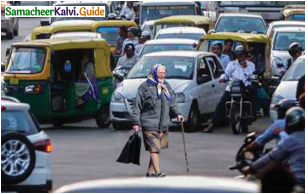
இது எதை குறிக்கிறது என்றால் அந்த தனிப்பட்ட சுதந்திரம் தொடர்ந்து செயலாற்றிவந்தால், அனைவரது சுதந்திரமும் கண்டிப்பாக குறையும். பிக்காடில்லி சர்கஸ்ஸில் (Piccadilly Circus) நடுவீதியின் வெளியே ஒரு காவலர் அவரின் கைகளை வெளியே நீட்டினால், அவர் கொடுங்கோன்மையின் சின்னம் அல்ல, ஆனால் அது சுதந்திரத்தின் அடையாளம். நீங்கள் அவ்வாறு நினைத்திருக்கலாகாது.
ஒருவேளை நீங்கள் அவசரப்பட்டு உங்களது மகிழுந்து கடுமையாக இழுக்கப்படுவதைக் காணலாம், உங்கள் சுதந்திரத்தை திடுக்கிடச் செய்வதாக உணரலாம். எப்படி இந்த இடர் தரும் மனிதன் நீங்கள் பொதுவான நெடுஞ்சாலையை உபயோகிப்பதில் தலையிடலாம் என்று நினைக்கலாம். பிறகு, நீங்கள் நியாயமான நபராக இருந்தால், உங்களிடம் தலையிடாதவர்கள் வேறு எவருடனும் தலையிடாதிருப்பார் என்பதைக் காட்டுவீர்கள்.
இதன் முடிவானது பிக்காடில்லி சர்கஸ் பயங்கர குழப்பம் நிறைந்த இடமாக மாறியிருக்கும். அவற்றை நீங்கள் என்றும் கடந்திருக்கயியலாது. தனிப்பட்ட சுதந்திரத்தின் குறைகளைக் கீழ்ப்படிதலுடன் ஏற்றுக் கொள்ள வேண்டும். அவை சமூக அமைப்பில் மகிழ்வு கொள்வதனால் உங்கள் சுதந்திரத்தை உண்மையாக்குகிறது.
சுதந்திரம் (liberty) என்பது ஒரு தனிநபரின் விருப்பம் மட்டும் அன்று, அது ஒரு சமூக கூட்டமைப்பு (social contract). இது விருப்பங்களை உள்ளடக்கியதாகும். எவரின் சுதந்திரத்தையும் தொடாதிருக்கையில் கண்டிப்பாக நான் (அ) நிச்சயமாக நான் விரும்பிய படியே என்னால் சுதந்திரமாக இருக்க முடிகிறது.
![]()
நான் நீண்ட அங்கியை அணிந்துக் கொண்டு சாலையில் நடந்தால், யார் என்னிடம் மறுப்புத் தெரிவிக்க முடியும்? நீங்கள் என்னைப் பார்த்து சிரிப்பதற்கு உங்களுக்கு சுதந்திரம் உள்ளது ஆனால் எனக்கும் அவற்றை புறக்கணிப்பதற்குச் (indifferent) சுதந்திரம் இருக்கிறது.
மற்றும் என் முடியை நிறமுள்ளதாக மாற்றிக் கொள்வதற்கும் அவற்றை விரும்புவதற்கும் (அல்லது) என் மீசையை வளர்ப்பதற்கும் அல்லது மேலாடை மற்றும் காலணிகளை அணிவதற்கும் அல்லது தாமதமாக உறங்குவதற்கும் அல்லது விரைவாக எழுவதற்கும், நான் என் விருப்பத்தையே பின்தொடர்வேன், அதற்கு யாரிடமும் அனுமதி பெறவேண்டியதில்லை. நான் இறைச்சியுடன் கடுகைச் சேர்த்துச் சாப்பிட்டால் உங்களிடம் கேட்பதற்கு வேண்டியதில்லை. மற்றும் உங்களால் என்னிடம் எதையும் கேட்க இயலாது.
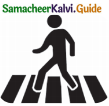
நீங்கள் இந்த மதத்தைப் பின்பற்றுகிறீர்களா அல்லது அதுவா என்றும், நீங்கள் விரும்புவது “எல்லரா வீலர் வில்லாக்ஸ்”-ஐ விட வர்ட்ஸ்வொர்த்-ஆ என்று அல்லது விலையுயர்ந்த பிரெஞ்சு ஒயினிலிருந்து எலுமிச்சைப்பானமா என்று கேட்க இயலாது. இவையனைத்தும் ஆயிரக்கணக்கான பிற விவரங்களும் நீங்கள், நான் தங்களையே மன்னித்துக் கொண்டும் மற்றும் ஒவ்வொருவரின் பிரிவின்மையும் ஏற்றுக்கொள்ளுதல் வேண்டும்.
![]()
நாம் ஒரு அரசாங்கத்தை (kingdom) கொண்டுள்ளோம் அவற்றை நாம் மட்டுமே அரசாட்சி செய்துக்கொண்டும், நினைத்ததை செய்தும், அறிவுடன் அல்லது ஏளனம் (ridiculous) செய்யும் விதமாக இருப்பதும், கடினம் அல்லது இனிமையாகவும், இயல்பாக அல்லது புதுமையாகவும் இருக்கலாம். ஆனால் எப்போது அந்த அரசாங்கத்தை விட்டு வெளியேறுகிறோமோ அப்போது, நம் தனிப்பட்ட செயல்களின் சுதந்திரம் மற்றவர்களின் சுதந்திரத்தால் தகுதியாக்கப்படுகிறது.
நள்ளிரவு முதல் காலை மூன்று மணி வரை காற்றிசைக் கருவி கொண்டு என்னால் பயிற்சிபெற விரும்ப முடியும். இவற்றைச் செய்வதற்கு எவரெஸ்ட் சிகரத்தின் உச்சிக்குச் சென்றால், இவற்றை என்னால் செய்ய இயலும், ஆனால் இவற்றை என் படுக்கையறையில் செய்தால் என் குடும்பத்தினர் எதிர்ப்பார்கள், மற்றும் இவற்றை நான் வீதியில் செய்தால் என் அண்டைவீட்டுக்காரர்கள் காற்றிசைக் கருவியை இசைப்பதற்குரிய என் சுதந்திரத்தை அவர்கள் அமைதியில் துயில் கொள்வதற்குரிய சுதந்திரத்தோடு தலையிடா வண்ணம் இருக்க நினைவூட்டுவர்.
இவ்வுலகில் அதிக மக்கள் இருக்கின்றனர் மற்றும் என் சுதந்திரத்தை அவர்கள் சுதந்திரத்தோடு உள்ளடக்கியாக வேண்டும். நாம் இந்த அனைத்து கட்டுப்பாடுகளையும் மறந்துவிடுகின்றோம். துரதிஷ்டவசமாக நாம் மற்றவரின் குறைகளில் அதிகம் கவனம் செலுத்துகிறோம் நம் குறைகளைவிட ஒரு தகுதியுடைய கூர்ந்து ஆராயத்தக்க மற்றவர்கள் உரிமைகள் அல்லது உணர்வுகள் சமூக வழி காட்டிக்கான அடித்தளமாக விளங்குகிறது.
![]()
சாலை விதிகளை கருத்துடன் கவனிக்க வேண்டியது ஒரு சிறு கருத்துத் தொடர்புதான், நாம் நம்மையே தீர்ப்பிட்டுப் பார்க்க வேண்டும். நாம் நாகரிகம் கொண்டவரா அல்லது நாகரிகம் அற்றவரா என்று அறிந்துக்கொள்ள வேண்டும். வீரம் மற்றும் தியாகம் இவற்றின் சிறந்த தருணங்கள் அரிதானவை. இவை பொது இடங்களில் நமது. சின்னஞ்சிறு நன்நடத்தைகள் நம் வாழ்க்கையின் பெரும்பகுதியாக அமைகின்றன. அவை வாழ்க்கைப் பயணத்தை இனிமையாகவோ, கசப்பாகவோ உருவாக்கி விடுகின்றன.